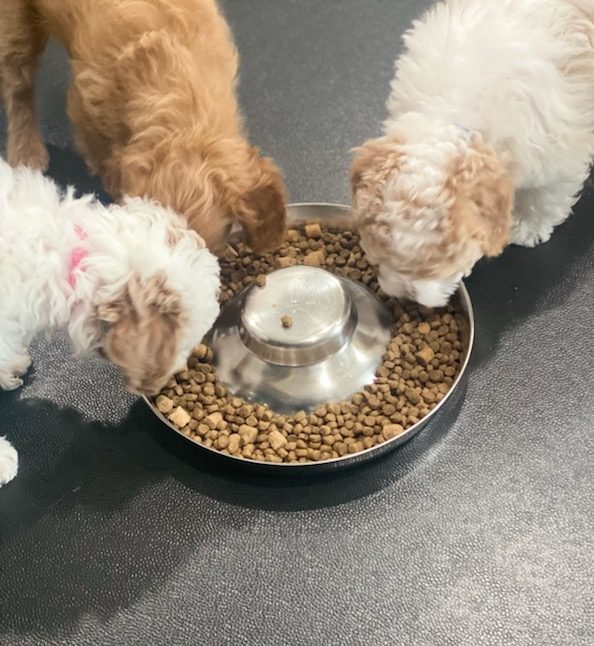Figuring out your dog’s diet can be intimidating to new dog owners. You want to ensure your furbaby is getting all the proper nutrients and that you don’t accidentally give them something that would hurt them! A good diet can help your dog live a long, happy, healthy life. If you have ever wondered, "What foods can my dog eat;" this information is for you.
Good quality dog food is a great basis for your dog’s diet, and some dogs do very well with a meal plan consisting solely of dog food. You want to make sure the ingredients are natural and recognizable with a named protein such as chicken or a fish first, as opposed to unnamed meat meals.
You also want to see whole grains, such as the ones humans eat, like whole wheat, brown rice, barley, rye, and vegetables in the dog food to ensure your pup has a balanced diet. Many dog foods containing grains have low-quality ones with little nutritional value. With this in mind, grain-free dog foods can be a good choice, to avoid those filler grains!

Dogs are primarily carnivores, so raw meat can be an excellent choice to feed your dog. Human-grade meat is best, as some pet meats have harmful preservatives.
Small amounts of cooked meat are good, as well, make sure it doesn’t have cooked bones, an excess of fat, or substances containing onions or garlic in them, as these are bad and toxic for dogs.
If you do feed your dog meat, balance it out with vegetables and grains like rice.
Fish is a fantastic source of protein - in moderation. Fully cooked fish, like salmon, also contains plenty of omega-3 fatty acids, which have health benefits like boosting your dog’s heart health. Check for bones first, as these can tear your dog’s intestines. Raw fish can carry harmful bacteria, and too much fish can lead to obesity, so it is best to talk to a vet before making fish a regular part of your dog’s diet.
Bones, especially raw, meaty bones, are suitable for keeping your dog’s teeth and gums healthy by helping to remove plaque. Keeping the bones raw is essential, as cooked ones are brittle and can splinter, potentially causing serious, if not life-threatening issues.
While bones are good for dogs, too much of a good thing isn’t suitable for anyone. Too many bones can constipate your dog, as can swallowing a whole bone. It’s best to keep bones to one or two a week and ensure they are big enough that your dog can’t fit their whole mouth around it.
While dogs are primarily carnivores, they need their veggies too! Vegetables like carrots, beets, pumpkins, yams, and green beans provide fiber to boost your dog’s digestive system. Celery, cucumbers, and squash also contain many essential vitamins and minerals to help your dog’s immune system, heart health, and more. Plus, celery helps freshen your doggie’s breath!
Other vegetables that are good for dogs, but more so in moderation, include brussels sprouts, cabbage, and broccoli (they can cause gas!).
It is important to note that while some vegetables are suitable for dogs, some are very toxic. Vegetables to avoid giving your pup include, but are not limited to: onions, garlic, and wild mushrooms. Onions and garlic can cause anemia, and wild mushrooms can be poisonous.
Fruits can be a great sweet treat to give your dog, with plenty of antioxidants, vitamins, and minerals. These should be restricted to a treat because their sugar content tends to be too high for dogs to consume regularly. Every once in a while, though, is perfectly fine! Some options include apples, bananas, blueberries, cantaloupe, cranberries, peaches, watermelon, and strawberries.
As with vegetables, some fruits are very bad for dogs. These include, but are not limited to: cherries, grapes, and tomatoes.
To round out the meat and the veg, dogs can have grains too! Whole wheat, brown rice, barley, oats, millet, quinoa, rye, and corn are all good sources of carbs for your dog. Do make sure the grains you get are good quality, as poor quality grains can lead to low nutritional values and allergies.
What foods can my dog eat? Now that we know what foods your pup can have, let’s review some of the ones they can’t.
What to avoid:
Now that you know the answer to the question, "What foods can my dog eat," hopefully you will feel more secure in what you choose to feed them! If you have any doubts, don’t be afraid to ask your veterinarian or a trusted breeder.